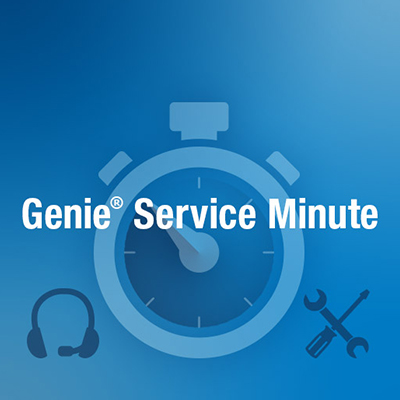Service Minute: The Importance of Technician Training Programs
by Bob Bartley - Sr. Director of Product Support and Service Solutions On Nov 16, 2018, 00:00 AM
Subscribe To Aerial Pros
Filter by tags
Training in the aerial industry is very important — a life is at stake each and every time someone gets into a piece of aerial equipment. I don’t say this for dramatic effect, I say it because it’s true. Equipment operators depend on the aerial lift to work and function properly and safely every time they use it, for every job they do. Operators must be trained to operate the equipment properly. The more trained and qualified operators there are, the safer jobsites will be.
Training goes beyond the operators. We also need to have technicians properly trained to work on, repair and maintain the equipment. Machines that receive the right care will run smoother, enhancing productivity on jobsites, while keeping operators safe. To make service and maintenance work more efficiently and help reduce downtime, technicians need to proficiently demonstrate the ability to calibrate, adjust and troubleshoot with the aid of available tools such as schematics, service manuals, laptop or table and connection software.
It is my goal to put the importance of training in a context everyone involved can understand. Think of it this way: We need to have qualified, knowledgeable and responsible technicians working on anything that holds a human in the air, right? To make sure of this, I always ask technicians I’m working with, “Are you comfortable with this repair?” They say, “Yes.”
And, I follow up with asking them, “Comfortable enough to put your child in it?” If they say yes again, I’m confident in what’s been done. But if they hesitate to answer or have second thoughts on the repairs, I know, and they know, we need to go back and keep working.
Why else is technician training important? Because it saves time and money.
 Let me explain: A trained technician not only knows how to read the equipment schematics and how to do the repair, but that technician also knows how to get the repair done in the least amount of time with a minimal amount of parts expense, because it translates to less downtime for the machine and a higher return on investment for the company. For example, an untrained technician might take four hours and a lot of guesswork on which parts are needed to complete the repair. A trained technician may be able to do the repair in two hours, saving time, and with the right parts, saving money.
Let me explain: A trained technician not only knows how to read the equipment schematics and how to do the repair, but that technician also knows how to get the repair done in the least amount of time with a minimal amount of parts expense, because it translates to less downtime for the machine and a higher return on investment for the company. For example, an untrained technician might take four hours and a lot of guesswork on which parts are needed to complete the repair. A trained technician may be able to do the repair in two hours, saving time, and with the right parts, saving money.
And, of course, there is the peace of mind knowing that equipment is properly maintained and in working order when it goes out to work on the next jobsite.
More information is available online at www.GenieLift.com, by phone +1 (800) 536-1800 or by contacting your local Genie Service representative or local Terex Equipment Service Centers.
Related Posts

Service Minute: The Value of a Certified Aerial Equipment Service Technician
Your aerial equipment fleet is a huge investment for your rental company, so it’s important that your service technicians are properly trained to perform the necessary maintenance and repair work needed to keep your investment up and running.
Continue Reading

Service Minute: Aerial Equipment Reliability Tips
Having worked in the Genie® field and phone support for over 20 years, I’ve noticed a couple of things about machine reliability
Continue Reading

Service Minute: Maintaining Your Genie® MEWPs in Extreme Temperatures
There are many mobile elevating work platforms (MEWPs) operating in Northern climates with extreme temperatures in North America and Europe.
Continue Reading

